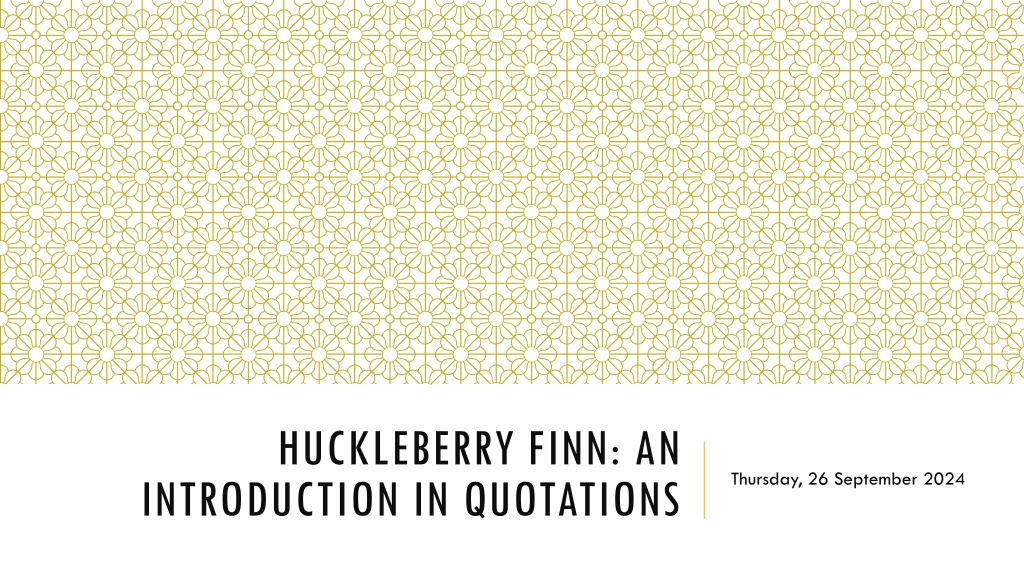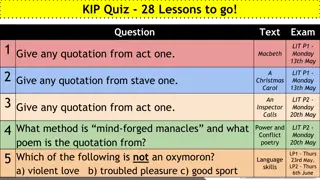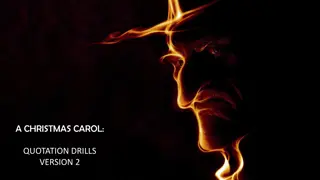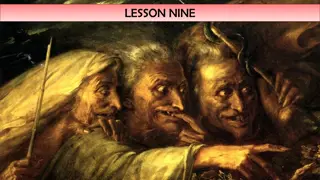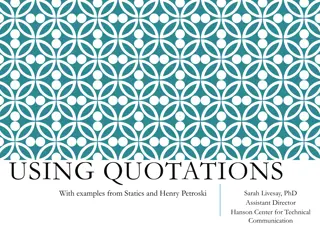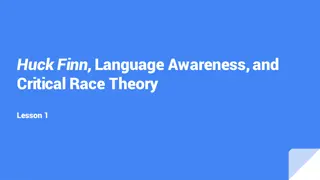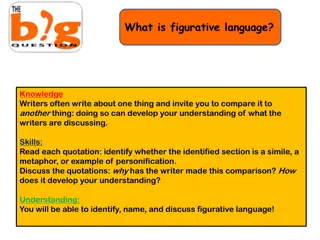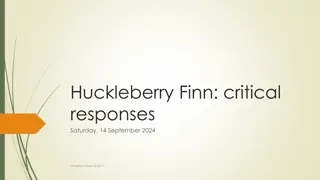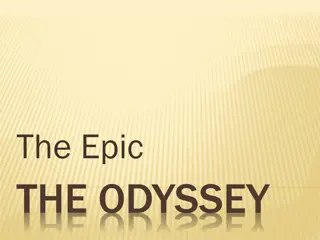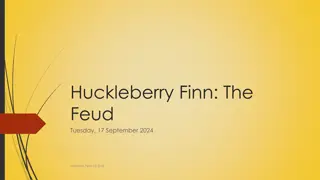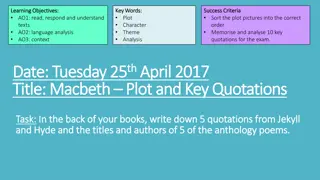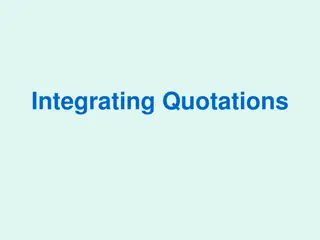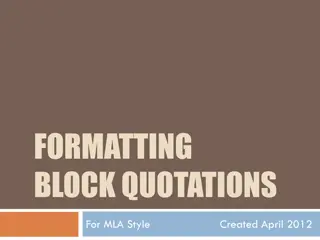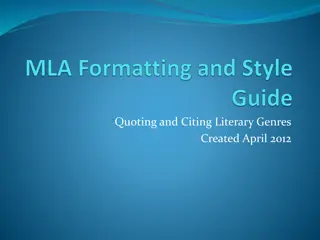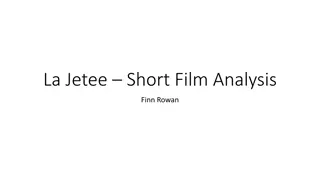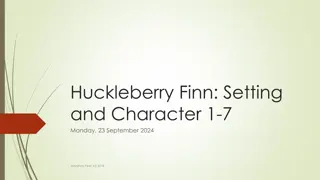Exploring Huckleberry Finn: A Literary Journey Through Quotations
Delve into the profound perspectives of renowned writers on Mark Twain's masterpiece, "Huckleberry Finn." Through insightful quotes from F. Scott Fitzgerald, Ernest Hemingway, H.L. Mencken, T.S. Eliot, and Eric Solomon, discover the enduring significance of Huck as a symbolic figure in American literature. From being hailed as a pioneering American hero to a lonely survivor navigating a changing world, the various viewpoints offer a captivating exploration of the novel's timeless impact and unique charm.
Download Presentation

Please find below an Image/Link to download the presentation.
The content on the website is provided AS IS for your information and personal use only. It may not be sold, licensed, or shared on other websites without obtaining consent from the author. Download presentation by click this link. If you encounter any issues during the download, it is possible that the publisher has removed the file from their server.
E N D
Presentation Transcript
HUCKLEBERRY FINN: AN INTRODUCTION IN QUOTATIONS Thursday, 26 September 2024
TAKE A LOOK AT THE FOLLOWING SLIDES AND WE WILL DISCUSS EACH IN TURN:
WRITERS PERSPECTIVES F. Scott Fitzgerald said "Huckleberry Finn took the first journey back. He was the first to look back at the republic from the perspective of the west. Ernest Hemingway said, "All modern American literature comes from one book by Mark Twain called Huckleberry Finn."
Huckleberry Finn -- H. L. Mencken says: "I believe that 'Huckleberry Finn' is one of the great masterpieces of the world, that it is the full equal of 'Don Quixote' and 'Robinson Crusoe,' that it is vastly better than Gil Blas, 'Tristram Shandy,' 'Nicholas Nickleby' or 'Tom Jones.' I believe that it will be read by human beings of all ages, not as a solemn duty but for the honest love of it, and over and over again, long after every book written in American betwen the years 1800 and 1860, with perhaps three exceptions, has disappeared entirely save as a classroom fossil. T.S Eliot: So we come to see Huck himself in the end as one of the permanent symbolic figures of fiction; not unworthy to take a place with Ulysses, Faust, Don Quixote, Don Juan, Hamlet and other great discoveries that man has made about himself.
Huckleberry Finn -- Eric Solomon (1985) "Huckleberry Finn himself is the most American of heroes: he is the boy-man in a male world... and solitary--alone even among others, a first-person narrator who is at home in nature and, like Cooper's Natty Bumppo, at a loss in town, yet as able to cope with the venality and evil of knaves as any Dashiell Hammett or Raymond Chandler version of the Scout. As alienated as a James Baldwin youth, and as deeply engaged in the search for a proper father as a Faulkner boy, Huck Finn, an American orphan... is, above all, a lonely survivor, one who accommodates to his changing world..."
IS IT ALL PRAISE? In his own words: I confine myself to the lifewith which I am familiar I confine to boy-life out on the Mississippi, because tha thad peculiar charm for me . As the most valuable capital in the building of novels is personal experience, I ought to be well- equipped . On nostalgia: simply mental and moral masturbation .
THE FREEDOM OF THE PILOT A pilot in those days was the only unfettered and entirely independent being that lived on earth writers of all kinds are manacled servants of the public. We write frankly and fearlessly, but then we modify before we print. In truth, every man and woman and child has a master, and worries and frets in servitude; but in the day I write of , the Mississippi pilot had none.
BEGINNING AND END CHAPTER I. YOU don t know about me without you have read a book by the name of The Adventures of Tom Sawyer; but that ain t no matter. That book was made by Mr. Mark Twain, and he told the truth, mainly. There was things which he stretched, but mainly he told the truth. That is nothing. I never seen anybody but lied one time or another, without it was Aunt Polly, or the widow, or maybe Mary. Aunt Polly Tom s Aunt Polly, she is and Mary, and the Widow Douglas is all told about in that book, which is mostly a true book, with some stretchers, as I said before. Tom s most well now, and got his bullet around his neck on a watch-guard for a watch, and is always seeing what time it is, and so there ain t nothing more to write about, and I am rotten glad of it, because if I d a knowed what a trouble it was to make a book I wouldn t a tackled it, and ain t a-going to no more. But I reckon I got to light out for the Territory ahead of the rest, because Aunt Sally she s going to adopt me and sivilize me, and I can t stand it. I been there before. THE END. YOURS TRULY, HUCK FINN.
CONSIDERATIONS: What is freedom and does society restrict or develop it? Can an individual maintain freedom in a civilised society? Innocence and Experience: Huck is around 13 - what does this make him? In what ways can a great river represent freedom in literature? Written in 1876 just over a decade after the civil war, consider the tensions: The North abolitionist and industrialised/ The South A Pastoral society which supported slavery The River flows from North to South what happens to Jim s freedom as they leave the partial freedom of the Norht and sail South?
FURTHER READING ON JSTOR critique of Eliot and Hemingway what's funny about HF? 7 essays
